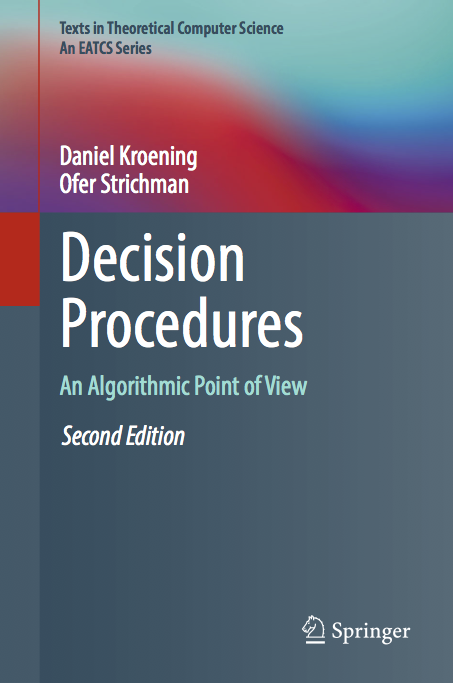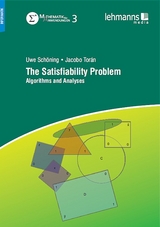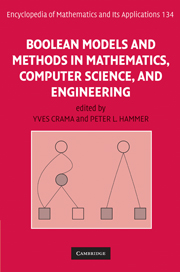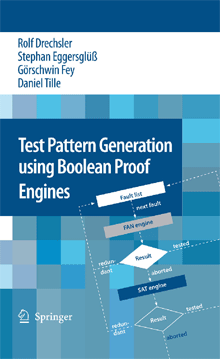Call for papers - JSAT special issue on SAT 2018 competitions and evaluations
**************************** Call for Papers ******************************
** **
** Special Issue on **
** SAT 2018 COMPETITIONS AND EVALUATIONS **
** **
** Journal on Satisfiability, Boolean Modeling and Computation (JSAT) **
** ISSN: 1574-0617, published by IOS Press **
** **
** Guest editors: Luca Pulina University of Sassari, Italy **
** Martina Seidl Johannes Kepler University Linz, Austria **
** **
***************************************************************************
IMPORTANT DATES
- Submission opens: September 15, 2018
- Submission deadline: October 30, 2018 (firm)
- First round reviews: December 30, 2018
- Revision deadline: February 28, 2019
- Final notifications: April 30, 2019
- Final versions: May 30, 2019
Final versions of accepted articles will be published online individually as soon as received by the journal editors. The special issue will appear either as part of a regular volume or as a specific volume depending on the number of accepted papers.
MOTIVATION
Boolean satisfiability (SAT) and related solver competitions organized during the last two decades have been a stimulating force to improve SAT solvers and related technologies. These competitions have encouraged developing novel algorithms, optimized implementation-level techniques and data structures to increase the practical performance and robustness of solvers. The competition benchmark suites are commonly used by the research community as the standard test set to evaluate progress. Additionally, the competitions provide large amounts of openly available data on solver performance on a large spectrum of benchmark families that encode important real and artificial combinatorial problems.
A lot more can be learned from these solver competitions than merely awarding and publishing the best-performing solvers. This special issue provides a venue to go beyond this, and welcomes research articles offering in-depth understanding of different aspects of the SAT 2018 SAT competitions and evaluation, inviting submissions describing solver techniques, benchmark families, competition reports, and thorough analysis and insights into the data produced by the competitions.
TOPICS OF INTEREST
Manuscripts addressing one or more of the following aspects related to the SAT 2018 competitions and evaluation are invited.
- Articles (full or system descriptions) presenting details on the
algorithmic and implementation-level aspects of original solvers with remarkable
performance during the SAT 2018 competitions and evaluation:
- SAT Competition,
- Sparkle SAT Challenge
- MaxSAT Evaluation,
- QBFEval
as well as other FLoC Olympic Games 2018 competitions tightly connected with Boolean satisfiability.
Remarkable is to be interpreted broadly, from good overall performance to very good performance on a specific set of benchmarks.
-
Full articles by competition organizers reporting on SAT 2018 competitions and evaluation. The articles should describe the competition, its criteria, why it is interesting to the SAT research community, execution environment used, analysis of the results (including how they compare to previous instantiations, if appropriate), and give a summary of the main technical contributions to the field, as well as discussions on lessons learned and suggestions for improvements for future competitions.
-
Full articles presenting non-trivial in-depth analysis of the data produced by SAT 2018 competitions and evaluation. The articles should give novel insights into the competition data, analyzing for example the structure of competition benchmarks and their relation to the effectiveness of different solver techniques in solving the benchmarks, scoring methods for ranking solvers, sensitivity of competition results, etc.
-
Full articles on new, relevant benchmark families submitted to the competitions, and related analysis of the competition benchmarks.
SUBMISSION INFORMATION
Submissions should be written using the JSAT latex style files.
Submission of manuscripts to the special issue will be possible from the journal web site via Easychair between September 15 and October 30, 2018.
Submitted manuscripts should not have been published previously, nor be under review for publication elsewhere.
CONTACT INFORMATION
For any questions, write an email to Luca Pulina (lpulina@uniss.it) and Martina Seidl (martina.seidl@jku.at)










